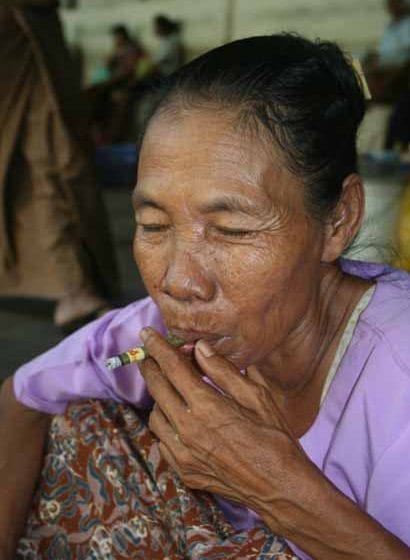National quit-line launched

Traditional tobacco products, such as cheroots, remain popular in Myanmar.
Following the launch of a national smoking quit-line in the Philippines, the Department of Health (DOH) hopes to reduce the country’s smoking prevalence from about 24 percent now to 15 percent by the end of President Rodrigo Duterte’s term, according to a story in the Philippine Daily Inquirer.
Launching the quit-line, Health Secretary Paulyn Jean Ubial urged the public to take advantage of the country’s newest anti-smoking initiative: the DOH quit-line 165-364.
She said that Filipino smokers should “make use of their cellphones for better health,” adding that the power to quit was in their hands.
Cellphone access in the Philippines, she added, had become a reliable and cheap communication tool even in remote areas.
“This is a dream come true for us anti-tobacco advocates,” Ubial was quoted as saying. “For so long we’ve been trying to establish a national quit-line and program for smoking cessation.”
Ubial made the remarks at the launch of the quit-line and a number of mobile cessation clinics aimed at providing counseling and support for Filipino smokers wanting to quit the habit.
She said that a “tobacco prevalence” of 29.7 percent in 2009 had dropped to 23.8 percent in 2015, which meant that about a million Filipinos had stopped “smoking”.
“We can reduce it further by nine to 10 percent, and bring it down to less than 15 percent smoking prevalence in 2022,” she said.
The World Health Organization’s 2013 estimate put the incidence of daily smoking in the country at 20.6 percent, made up of 35 percent of men and 6.4 percent of women.
The quit-line, which is accessible also by texting ‘STOPSMOKE’ to 09290165364, will be free initially in Metro Manila but toll charges will apply for long-distance calls.
The quit-line and the mobile cessation clinics will be hosted by the Lung Center of the Philippines in Quezon City, which is hiring 21 people to answer calls in two shifts, 24/7.
A budget of P27 million was allocated for the program this year, though it was said that this might go up next year.
